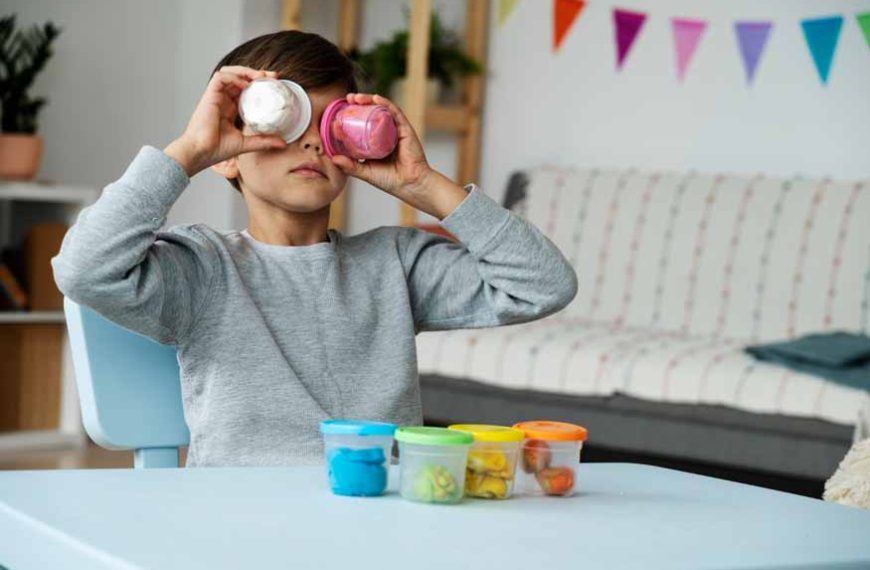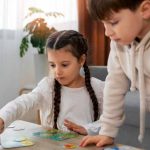From the first gurgling laugh to the wobbly first steps, childhood is a whirlwind of discovery and growth. Every experience, every interaction, every giggle and tear leaves an indelible mark on a child’s developing mind and personality. It’s like building a magnificent mosaic – each piece, each developmental experience, plays a crucial role in shaping who a child becomes.
In India, with its rich cultural tapestry and diverse family structures, understanding the importance of child development is more vital than ever. Childhood experiences and personality development are deeply interconnected. Let’s dive into the fascinating world of childhood experiences and explore how they impact a child’s journey:
Building the Foundational Blocks:
Dive deeper into brain development: Explain the key stages of brain development from birth to 5 years old and how specific experiences impact each stage. For example, highlight the importance of sensory play in the first year for building connections in the sensory cortex, or how storytelling in pre-school stimulates language processing areas.
Go beyond the obvious: Expand on the listed examples of cognitive, social-emotional, and physical development activities. Include age-appropriate ideas for each area, showcasing diverse options like building with blocks, singing songs, exploring different textures, role-playing scenarios, and engaging in physical games like tag or obstacle courses.
Emphasise the role of caregivers: Explain how secure attachments with caregivers provide the foundation for emotional well-being and social development. Highlight ways caregivers can foster these attachments through responsive interactions, positive affirmations, and emotional validation.
Beyond Academics: The Power of Experiential Learning:
Connect each activity to its benefits: For each experiential learning activity, delve into the specific skills and qualities it helps develop. Explain how nature walks nurture curiosity and observation skills, how art activities boost creativity and self-expression, and how storytelling fosters empathy and collaborative skills.
Get specific with Indian examples: Showcase Indian cultural experiences that act as powerful learning tools. Include activities like celebrating festivals, participating in local traditions, or learning folk songs and dances. Explain how these experiences connect children to their heritage and community while promoting social-emotional growth.
Incorporate technology in a balanced way: Discuss how technology can be used as a tool for experiential learning, but emphasise the importance of maintaining a balance with real-world, hands-on experiences. Suggest educational apps and online resources that complement outdoor play, artistic activities, and social interactions.
Shaping Well-Rounded Individuals:
Provide real-life examples: Illustrate the positive outcomes of prioritising developmental experiences through the stories of successful individuals. Showcase how nurturing specific skills in childhood like critical thinking, empathy, or physical agility led to achievements later in life.
Address potential challenges: Acknowledge common concerns parents might have about prioritising experiences over academics, such as preparing for competitive exams or ensuring academic success. Explain how a strong foundation in developmental skills actually supports academic learning and fosters a lifelong love of learning.
Focus on holistic development: Go beyond the listed skills and highlight the importance of nurturing other aspects of a child’s personality, such as resilience, adaptability, and a sense of humour. Provide examples of experiences that promote these qualities, such as facing challenges in outdoor play, collaborating with diverse peers in games, or learning to laugh at oneself.
Investing in a Bright Future:
Quantify the impact: Present statistics or research findings that demonstrate the long-term benefits of investing in early childhood development, both for individuals and society as a whole. Highlight the economic gains, improved social indicators, and overall societal well-being that results from nurturing children’s potential.
Call to action: Encourage readers to take action and prioritise their child’s developmental experiences. This could involve joining playgroups, exploring their community, seeking out enriching activities, or enrolling in a preschool with a focus on experiential learning like EuroKids.
Connect to a broader societal message: Link the importance of child development to larger societal issues like inclusivity, diversity, and sustainability. Explain how cultivating well-rounded individuals who are empathic, responsible, and involved in their communities can help to ensure a brighter future for everybody.
Unleashing the Power of Play:
The magic of experiential learning activities is real! Play is not just a carefree activity for children; it’s the engine that drives their development. From imaginative solo play to boisterous group games, each type of play offers unique benefits. Let’s explore how:
Solo Play: Building sandcastles, creating elaborate stories with figurines, or simply daydreaming under a tree – solo play allows children to dive into their inner world, nurturing creativity, problem-solving skills, and self-reliance. They experiment, invent, and explore their own ideas, building confidence and a sense of independence.
Group Play: From chasing each other to collaborating on a play in the backyard, group play teaches children valuable social skills like communication, cooperation, and negotiation. They learn to share, take turns, and resolve conflicts, building empathy and understanding of others. Additionally, group games often involve physical activity, promoting coordination, teamwork, and a healthy sense of competition.
By encouraging both solo and group play, we provide children with a balanced spectrum of experiences that shape them into well-rounded individuals with strong imagination, social skills, and a love for learning. Both solo & group play are great experiential learning activities.
Nurturing Through Nature:
India boasts a rich tapestry of natural landscapes, from lush forests to majestic mountains and serene beaches. Immersing children in these diverse environments unlocks a treasure trove of developmental benefits:
Sensory Exploration: The sights, sounds, and smells of nature engage children’s senses, encouraging exploration and curiosity. They improve their cognitive skills and feeling of amazement about the world around them when they run barefoot on grass, splash in a stream, or listen to birds chirping.
Physical Development: Climbing rocks, scrambling over fallen trees, and playing hide-and-seek in the woods provides natural opportunities for physical activity. These play experiences promote gross motor skills, coordination, and balance, while fostering a love for movement and the outdoors.
Environmental Awareness: Spending time in nature fosters a connection with the environment and instil a sense of responsibility towards its preservation. Planting trees, seeing wildlife, and learning about ecological processes foster environmental awareness and urge children to become responsible stewards of our earth.
By introducing children to the magnificent world of nature, we improve their development in both body and mind, developing a lifetime connection to the environment and a feeling of awe that stimulates their curiosity and growth.
Where Learning Becomes an Adventure: EuroKids Preschools:
At EuroKids, we understand the profound impact of developmental experiences. Our curriculum is meticulously designed to provide children with a holistic learning environment that fosters cognitive, social, emotional, and physical development. Through play-based learning, exploration, and engaging activities, we nurture every child’s unique potential and help them blossom into their best selves.
Start your child’s journey towards a fulfilling future. Explore the world of EuroKids preschools today and give your child the gift of enriching developmental experiences.















